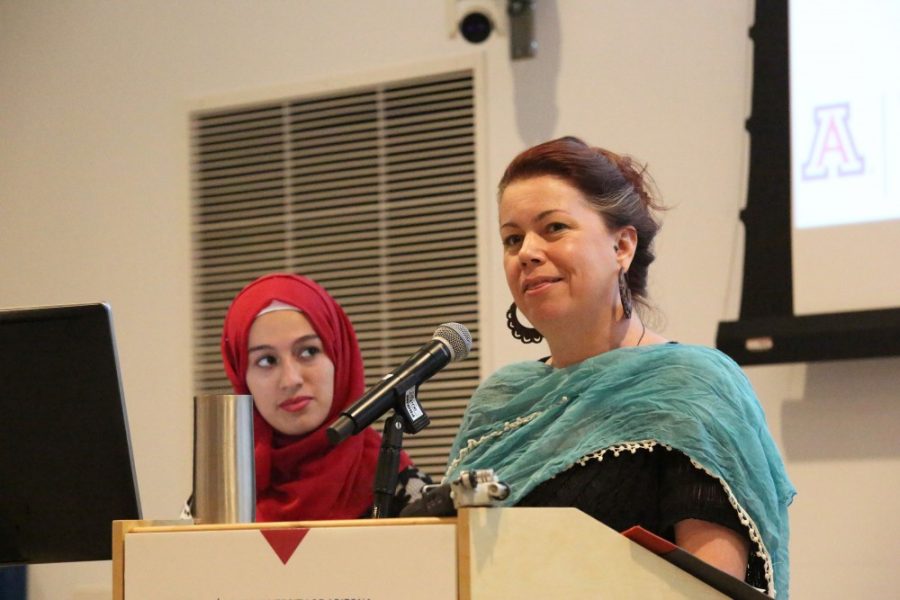Refugees revealed some of the obstacles they face in reaching the US. and getting settled during a panel discussion put on by UA professors Joseph Farbrook, Lisa Hochtritt, Orhon Myadar and Stephanie Troutman. The panel was funded by a grant through the Confluencenter For Creative Inquiry Thursday evening. “Dismantling Fear: Voices of Tucson’s Refugee Community” brought together nine speakers to share their views and stories.

Abdirahman Chirango: “I did not choose to become a refugee”
Abdirahman Chirango, UA graduate and local business owner, started the evening with his story of fleeing from Kenya.
“I still remember how I became a refugee,” Chirango said. “My mom was shot, point-blank, in front of me. That dark day still haunts me.”
Chirango described the twelve years in a Kenyan refugee camp and his struggle to be resettled. He said the greatest luxury, once here, was feeling safe.
“Something I will forever cherish and forever be grateful for is being able to go to sleep at night and knowing nobody will attack me, knowing nobody is going to come after my family,” Chirango said.
Overall, Chirango hopes the U.S. will not ignore refugees in a time of such worldwide displacement.
Melanie Cooley and Houda Houssam: “Finding a refuge in friendship”
Melanie Cooley, a member of the Arizona Welcomes Refugees, and Houda Houssam, a refugee from Syria, talked about integration.
Houssam described the reception she received, saying people were kind and lived up to expectations. Cooley told the story of how she met Houssam at a potluck and said being a good neighbor vital.
“It’s not about having any special skills besides the ability to be a good neighbor,” Cooley said. “When we think about people as a group, it’s really easy to think of them as other, and to think of them as scary, but when we know people as individuals it completely changes our dynamic.”
RELATED: Trump signs revised executive order limiting refugees, Middle East travel
Jeffrey Cornish: Refugee Exceptionalism vs our Humanitarian Mandate
Jeffrey Cornish, director of the International Rescue Committee, talked about the danger of the exceptional refugee narrative.
Cornish said though some refugees achieve economic self-sufficiency rapidly, it’s not fair to expect them to completely revitalize towns.
“Refugee exceptionalism can be used to create distinctions, implying there are deserving and undeserving poor,” Cornish said. “When refugees do succeed, their stories are used to undermine evidence of racial and economic injustice.”
Cornish focused on returning to the core mission of the U.S. humanitarian mandate: supporting refugees on a basis of human rights, not because their plight is deemed worthy.
Marge Pellegrino: Costs and Strategies to Combat Xenophobia
Marge Pellegrino, program facilitator at Owl and Panther, an organization for refugees who have experienced torture and trauma, spoke about refugee’s reoccurring trauma.
“You don’t overcome trauma, you get used to it,” Pellegrino said. “Neurobiology speaks to trauma being prone to be reactivated and retriggered, so exposure to xenophobia can in turn retraumatize people.”
Pellegrino said even without direct acts of xenophobia, the atmosphere of fear is just as damaging.
“If you’re afraid it’s going to happen to you, that’s just as powerful as if it was a reality,” Pellegrino said.
For those reasons, Pellegrino said understanding and compassion are necessary for resettlement.

Özlem Özgür: Refugees and connecting cultures
Özlem Özgür, an artist and filmmaker working with refugees, shared three projects.
The “Tastebud Memories” documentary are short digital stories about refugees’ homes and lives related to food.
“Visual Storytelling” is a project with Owl and Panther families, where teenage refugees made films about their lives that were shown at The Screening Room in April 2016.
“DocVisions” was a similar project to “Visual Storytelling”, in Mansfield High School and with Pima County Public Library. That project was done with a Confluencenter for Creative Inquiry grant.
Barbara Eiswerth and Faeza Hillian, Working Cooperatively Together
Faeza Hillian, a retired dentist from Iraq, volunteer at Iskashitaa Refugee Network and Barbara Eiswerth, UA graduate and founder of Iskashitaa Refugee Network, also focused on community support.
Eiswerth said having tough conversations and addressing misconceptions is difficult but necessary.
“We have to look at our judging and our opinions and groupings of people that aren’t accurate,” Eiswerth said.
RELATED: UA professors receive $1.4 million grant to study motive and movement of refugees
Lynn Marcus: The U.S. Overseas Refugee Program and the Impact of the New Executive Order
Lynn Marcus, law professor and co-director of UA’s Immigration Law Clinic, explained Trump’s executive orders on immigration and the significant cut in refugees admitted this year, from 110,000 to 50,000.
“The number one impact is for the individuals not admitted,” Marcus said. “For the people who have been waiting in the refugee camps, who maybe had been approved and run through the security checks that are now going to expire, they have to start the process over. That’s devastating.”
The second largest impact is the example the U.S. set, and Marcus urged people to become more active.
“We have to speak out for refugees to our representatives,” Marcus said. “We have to be clear that as people of Arizona we don’t think it’s enough to take in just a few refugees and call it a day.”
Overall, the panel’s message was one of community involvement and and support in a time of fear and massive worldwide crisis.
Follow Marissa Heffernan on Twitter.









